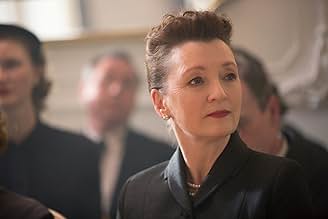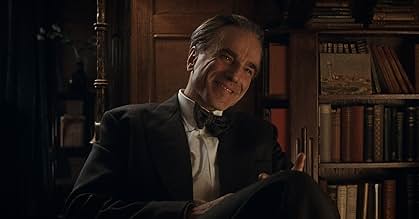London in den 1950er Jahren: Reynolds Woodcock ist ein renommierter Schneider, dessen kontrollierter Lebensstil von der jungen, willensstarken Alma, die seine Muse und Geliebte wird, in Frag... Alles lesenLondon in den 1950er Jahren: Reynolds Woodcock ist ein renommierter Schneider, dessen kontrollierter Lebensstil von der jungen, willensstarken Alma, die seine Muse und Geliebte wird, in Frage gestellt wird.London in den 1950er Jahren: Reynolds Woodcock ist ein renommierter Schneider, dessen kontrollierter Lebensstil von der jungen, willensstarken Alma, die seine Muse und Geliebte wird, in Frage gestellt wird.
- Regie
- Drehbuch
- Hauptbesetzung
- 1 Oscar gewonnen
- 55 Gewinne & 121 Nominierungen insgesamt
Empfohlene Bewertungen
My Rating : 8/10
This is a delicately executed drama intimately woven around the characters of Daniel Day-Lewis as Reynolds Woodcock and Vicky Krieps as Alma.
Right from the opening shots I was engaged and the brilliant performances, beautiful background music coupled with breathtaking cinematography make this a worthwhile watch if you are in the mood for something slow, something a bit art-y. However if you are not in the mood for something like this it can become a chore to watch so I ask the viewer to understand that it is a very beautiful film and in the right frame of mind you will be absorbed into the world of this renowned mid-twentieth century dressmaker who can be a bit fussy.
Daniel Day-Lewis is at his typical level of brilliance here. He perfectly plays the role of an obsessive personality, who is so averse to letting someone interfere with his work, yet who more and more, through both natural and artificial means, also doesn't want to lose the new woman in his life.
Stylish camera work, wonderfully-paced drama. Solid 8/10.
This is a delicately executed drama intimately woven around the characters of Daniel Day-Lewis as Reynolds Woodcock and Vicky Krieps as Alma.
Right from the opening shots I was engaged and the brilliant performances, beautiful background music coupled with breathtaking cinematography make this a worthwhile watch if you are in the mood for something slow, something a bit art-y. However if you are not in the mood for something like this it can become a chore to watch so I ask the viewer to understand that it is a very beautiful film and in the right frame of mind you will be absorbed into the world of this renowned mid-twentieth century dressmaker who can be a bit fussy.
Daniel Day-Lewis is at his typical level of brilliance here. He perfectly plays the role of an obsessive personality, who is so averse to letting someone interfere with his work, yet who more and more, through both natural and artificial means, also doesn't want to lose the new woman in his life.
Stylish camera work, wonderfully-paced drama. Solid 8/10.
7axb
Let us get this out of the way- Phantom Thread is a beautiful film with a great premise and promise. A couture dress designer (Daniel Day Lewis) is demanding in the extreme and finds a muse (Vicky Krieps). He enjoys using her as a dress model and a companion, but she wants more. Along the way, the director, Paul Thomas Anderson, throws hints of intrigue starting with the title of the film. There are empty pretensions of dress-making as high art, secret messages sown into dresses and haunting memories. All of this leads to- exactly nowhere. Everything Lewis and Krieps do is recorded lovingly and meticulously on film with great mood music in the background. But there is no great reveal, no deep insight into human psyche, no higher truth. In the end it comes down to what a woman wants and what the man can live with. Lewis and Krieps are excellent, especially Krieps, but Lesley Manville as Lewis's sister has the thankless job of looking stern in every scene. Nothing in the film sticks with you when you leave the theater except the dresses, photography and the music; because Anderson has not come up with anything really interesting in the story. Unlike his "There Will Blood", which was a great film, Phantom Thread is a phantom film. It is a beautiful ghost of what should have been a really good film. See it if you wish to say goodbye to Daniel Day Lewis, but keep your expectations low.
Intimate, delicate, and a beautifully crafted masterpiece. Paul Thomas Anderson manages to expresses an artist's creative journey through threads of fashion and romance with such subtlety that it could only be conveyed through the medium of film. An atmosphere reminiscent of Kubrick's achievements, this romantic odyssey illustrates a unique perspective of love; a perspective in which love is shaped and manipulated by the fragile strings of each character's hearts.
To begin with, I will praise an awfully disregarded aspect of "Phantom Thread": the cinematography and direction. The style and manner in which Paul Thomas Anderson uses silence and long takes is ingenious, and as stated above, was most likely inspired from Kubrick's works. Similar to the quote, "The less you say, the more your words will matter," the more silence, the more each line will signify. The more long takes, the more each short take will signify. Therefore, this method permits a greater control over the variety of dramatic effects; and in turn, the audience's emotions. Anderson also utilized this technique in many of his other films, including "The Master", "Magnolia", and his masterpiece, "There Will Be Blood".
Of course, this strategy doesn't always serve well. The more the audience regards the dialogue, the more engaging the screenplay has to be. The more engaging the screenplay is, the more compelling the performances have to be.
Yet "Phantom Thread" has all of this. Magnificent lead performances by Daniel Day-Lewis and Vicky Krieps, a strong and often overlooked supporting performance by Lesley Manville, and a sharp, dense original screenplay written by Paul Thomas Anderson himself. A few sprinkles of comedy are also blended in the script, which is always valuable for a romance. Not to forget the costume design either, which was essential to establish a post-war 1950s London environment.
And finally, the score. Arguably the strongest part of the film, the score possesses Paul Thomas Anderson's signature strange aura that is found in several of his other films. It's not a coincidence that one of his most frequent collaborators is Jonny Greenwood, who composed the score for this film, "There Will Be Blood", and many others. While most movies nowadays would use music to heighten drama, Paul Thomas Anderson rejects the common norm; valuing music to form an atmosphere. This atmosphere is crucial in almost all of his works, creating an eerie tone for a mystery that drives the story forward.
A transcendental and sublime work of art so remarkably subtle- delicately transfixing the audience ever so slightly, exploring the convoluted depths of an artist's obsession, and expanding cinema's horizons for miles of wonder- all woven beneath the intertwined threads of the phantom.
Farewell, Daniel Day-Lewis. We will miss you.
To begin with, I will praise an awfully disregarded aspect of "Phantom Thread": the cinematography and direction. The style and manner in which Paul Thomas Anderson uses silence and long takes is ingenious, and as stated above, was most likely inspired from Kubrick's works. Similar to the quote, "The less you say, the more your words will matter," the more silence, the more each line will signify. The more long takes, the more each short take will signify. Therefore, this method permits a greater control over the variety of dramatic effects; and in turn, the audience's emotions. Anderson also utilized this technique in many of his other films, including "The Master", "Magnolia", and his masterpiece, "There Will Be Blood".
Of course, this strategy doesn't always serve well. The more the audience regards the dialogue, the more engaging the screenplay has to be. The more engaging the screenplay is, the more compelling the performances have to be.
Yet "Phantom Thread" has all of this. Magnificent lead performances by Daniel Day-Lewis and Vicky Krieps, a strong and often overlooked supporting performance by Lesley Manville, and a sharp, dense original screenplay written by Paul Thomas Anderson himself. A few sprinkles of comedy are also blended in the script, which is always valuable for a romance. Not to forget the costume design either, which was essential to establish a post-war 1950s London environment.
And finally, the score. Arguably the strongest part of the film, the score possesses Paul Thomas Anderson's signature strange aura that is found in several of his other films. It's not a coincidence that one of his most frequent collaborators is Jonny Greenwood, who composed the score for this film, "There Will Be Blood", and many others. While most movies nowadays would use music to heighten drama, Paul Thomas Anderson rejects the common norm; valuing music to form an atmosphere. This atmosphere is crucial in almost all of his works, creating an eerie tone for a mystery that drives the story forward.
A transcendental and sublime work of art so remarkably subtle- delicately transfixing the audience ever so slightly, exploring the convoluted depths of an artist's obsession, and expanding cinema's horizons for miles of wonder- all woven beneath the intertwined threads of the phantom.
Farewell, Daniel Day-Lewis. We will miss you.
PHANTOM THREAD just annihilated me. It's completely worthy of all the immense hype (such as, most cinephiles considering it the best film of 2017). It grows and builds in as organic a manner that a film possibly can. At first, I wasn't sure how I felt - I needed to get to know the characters, then, through most of the movie, I was cracking up at all the tension and the misery between them, then, by the last 10 minutes, I was in tears - a flow of tears which increased each minute as I processed the power and uniqueness and realness of what I had just witnessed. They were "profound" tears. I don't know that I've ever seen a movie that so tastefully glamorizes the toxicity of love. The poison that so many of us romanticize, the poison that we NEED in our lives. There are two types of people in the world: people who feel at home in perfectly "healthy" relationships, and then there's the rest of us. This film is for the rest of us. It stands in a league of it's own. I could never have expected the conclusion - the way that the ribbon is tied, the way the final thread is sewn. It hit me like a bag of bricks. It is all of the pain in love and all of the beauty, all at once. I have never seen this story told before. It's completely original, and completely shattering. The three leads are absolutely astonishing - Daniel Day Lewis and Lesley Manville are terrifying - Vicky Krieps is the most real. The writing and directing is impeccable - P.T. Anderson's legacy continues, it's fire burning brighter than ever. Yes, this is a masterpiece. I am dead.
This is obviously a carefully crafted film: from the scenes, the acting, the words, the clothes, the facial and body movements, the music, it is all careful and artistic. That being said, it is terribly descriptive: an obsessive dress maker finds his muse in a strange woman who wants him to be hers alone. There is nothing else, just their play back and forth, and then the film ends. If you are here for the quality of film making, then you will probably like the film. If you want some insight into human psyche, this is a good film to learn from, with actors as dedicated as Lewis, Manville and Krieps. If you are looking for an interesting story that fills you with emotion and teaches you new things, you may be disappointed.
It doesn't help that neither of the characters in this film is even remotely relatable. Lewis' character is the typical obsessive genius that is careless of others and focuses on his work above all else. Yet he is not that much of a genius, just a failed human being with some temporary success and weird fetishes. Manville's character is a stern woman who's only purpose in life seems to care for Lewis to the point of losing herself, to keep things in balance when his histrionics threaten "the house". Krieps' character is plain creepy. If you want something to make you fear women, this is a great start. She is concomitantly lovely and well intentioned and borderline psychotic.
Bottom line: a very technical and artistic study on a rather boring subject and some unrelatable people.
It doesn't help that neither of the characters in this film is even remotely relatable. Lewis' character is the typical obsessive genius that is careless of others and focuses on his work above all else. Yet he is not that much of a genius, just a failed human being with some temporary success and weird fetishes. Manville's character is a stern woman who's only purpose in life seems to care for Lewis to the point of losing herself, to keep things in balance when his histrionics threaten "the house". Krieps' character is plain creepy. If you want something to make you fear women, this is a great start. She is concomitantly lovely and well intentioned and borderline psychotic.
Bottom line: a very technical and artistic study on a rather boring subject and some unrelatable people.
Wusstest du schon
- WissenswertesPaul Thomas Anderson got the initial idea for the film while he was sick in bed one day. His wife, Maya Rudolph, was tending to him and gave him a look that made him realize that she had not looked at him with such tenderness and love in a long time.
- PatzerA character says, "I don't mean to be racist..." That word didn't exist, at least in British English, in the 1950s. Someone might have used "racialist".
- Zitate
Reynolds Woodcock: Kiss me, my girl, before I'm sick.
- Crazy CreditsThe typeface used for the credits is called Reynolds Stone and it was created by English wood engraver, typographer, and designer Reynolds Stone, who was a close friend of the parents of Daniel Day-Lewis.
- VerbindungenFeatured in 75th Golden Globe Awards (2018)
- SoundtracksMy Foolish Heart
Written by Ned Washington and Victor Young
Performed by Oscar Peterson
Courtesy of The Verve Music Group
Under license from Universal Music Enterprises
Top-Auswahl
Melde dich zum Bewerten an und greife auf die Watchlist für personalisierte Empfehlungen zu.
- How long is Phantom Thread?Powered by Alexa
Details
- Erscheinungsdatum
- Herkunftsländer
- Offizielle Standorte
- Sprachen
- Auch bekannt als
- El hilo fantasma
- Drehorte
- Victoria Hotel, Station Road, Robin Hood's Bay, Whitby, North Yorkshire, England, Vereinigtes Königreich(where Reynolds meets Alma)
- Produktionsfirmen
- Weitere beteiligte Unternehmen bei IMDbPro anzeigen
Box Office
- Budget
- 35.000.000 $ (geschätzt)
- Bruttoertrag in den USA und Kanada
- 21.198.205 $
- Eröffnungswochenende in den USA und in Kanada
- 216.495 $
- 31. Dez. 2017
- Weltweiter Bruttoertrag
- 52.204.454 $
- Laufzeit
- 2 Std. 10 Min.(130 min)
- Farbe
- Sound-Mix
- Seitenverhältnis
- 1.85 : 1
Zu dieser Seite beitragen
Bearbeitung vorschlagen oder fehlenden Inhalt hinzufügen



































